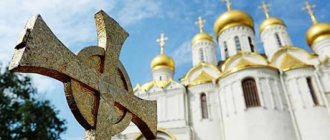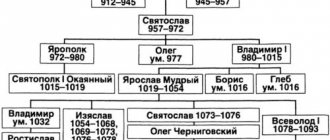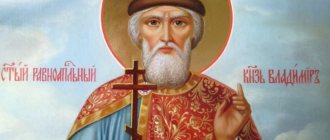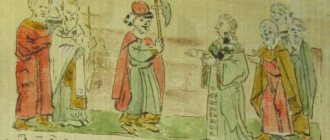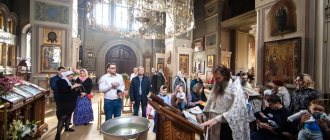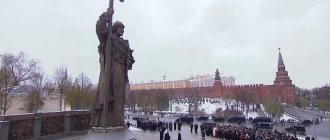According to the Joachim and Nikon Chronicles, the baptism of Novgorod took place in 990–991. and was carried out in several successive stages. The introduction of Christianity instead of paganism was carried out on the initiative of the great Kyiv prince Vladimir Svyatoslavich, who went down in history under the nickname Red Sun. To perpetuate this event, which influenced the development and strengthening of the Russian state, in 1862 a monument to the 1000th anniversary of the baptism of Rus' was erected on the territory of Novgorod.
Circumstances of the baptism of Novgorod
The strengthening of the new religion was preceded by the adoption of Christianity by Vladimir himself, the princely entourage and all the inhabitants of Kyiv, which took place in 988. At the same time, pagan sanctuaries and temples were destroyed throughout the Russian land, and idolatry was eradicated.
After the baptism of Kyiv, Vladimir Svyatoslavovich decided to spread Orthodoxy throughout the state, the most important political, trade and craft center of which at that time was Novgorod. It was known as a large city, which, at the baptism of Rus', became the site of a serious confrontation between pagans and Christians. Prince Vladimir understood well that the Novgorodians, rooted in the pagan faith, would most likely resist and would not be baptized en masse, like the Kyivians. That is why he entrusted the spread of Christianity in Novgorod to his uncle, the experienced governor Dobrynya. Voivode Putyata and Bishop Joachim and his retinue went with him to baptize the Novgorodians.
The Weakness of Orthodoxy
The most absurd argument, to be honest. I am truly perplexed when I hear it. Let's figure it out on our fingers. The same “professor” (he is not a member of the Russian Academy of Sciences) Levashov claims that the ancient Russians were powerful warriors, strong magicians, and each warrior alone could cope with an army. Aryans, they say, are carriers of ancient powerful knowledge. Which they “know”. And which are already 30,000 years old.
All this sounds great, but...my friends, how did it happen then that these super-warriors were baptized “with fire and sword”? In whose hands was the fire and the sword? I have a slight stupor. So whether or not there were certain “knowing warriors”, mighty Russians, or...
Well, suppose Rus' was baptized by hired Varangian forces, who didn’t care who they drove into the river.
And where then is the epic strength of these very “knowing” super-warriors, if they were easily bent over and put in the river to be baptized by some mercenaries? Where is the notorious super power? So who was stronger, the one who baptized, or the one who succumbed? History does not know the subjunctive mood. History shows that Orthodoxy replaced the faith of our ancestors. This means that it is somehow difficult to call Orthodoxy weak. Even if we accept the logic of “native” and “foreign” gods, why worship gods who could not even save themselves? Isn't it more logical to move to a strong God?
But in a strange twist of consciousness, detractors of Orthodoxy hint at some special super-value of the “native”. Which for some reason seems to be strong, but is defeated by the religion of the slaves. This is strange.
Even if the critics are atheists, why resort to a clearly poor-quality argument about the weakness of Orthodoxy, if the history of our army was more than victorious and Orthodox Rus' had many victories?
Regardless of whether Orthodoxy as an idea is right, calling it weak is a shame? Or hide the argument about fire and sword away and never bring it out. Because a sword and weakness somehow don’t go together. There is no in Orthodoxy what is attributed to it - weakness. Orthodoxy is the religion of warriors. And there is no shame in being servants of God if we remember that we believe that this Being created the entire universe. It's quite ambitious to consider yourself a servant of a higher being, isn't it? Here, many are ready to kill for the position of an official, and to be a “servant of the people” and this term in this capacity does not scare anyone. To be a servant of the state. the device is normal. But to be a servant of a Supreme Being is no, no, it’s suddenly shameful. Double standards are obvious.
And it is surprising when ideological people who long to be servants not of the state machine, but of Christ, are criticized. What's bad about it? Giving new meaning to life to drug addicts and drunkards, helping the sick, sharing their last breath with people in a hospice. Yes, at least don’t swear, finally.
Yes, the Orthodox are skimpy on such actions.
But this is because we are bad Orthodox, and not because we have not been given the right guidelines. If every person fulfilled the covenant of Christ, Paradise would come on earth. One could say “where are they, the warriors”? We see only grandmothers in the temple. This is the problem, that there are no warriors left anywhere. Only armchair warriors remained. And Orthodoxy is rapidly losing its masculine and strong part. And there is nothing to be happy about here. Dignity, courage and nobility go hand in hand with faith.
How did Novgorodians perceive the new faith?
Novgorod went down in history as the city that showed the greatest resistance to the adoption of Orthodox Christianity. Unlike Kyiv, events unfolded here in a far from peaceful manner.
Having learned about the imminent arrival of Dobrynya with an armed army, the local pagans gathered a veche. Most of those present decided not to allow the Kyiv envoys into the city and to protect the old churches in every possible way.
However, not all townspeople agreed with the position of the pagan wise men, who were afraid of losing their influence on the local population. In light of the events taking place, the Novgorodians were divided into two opposing camps:
- the first group of townspeople supported the upcoming baptism, since Christian communities already existed in the city;
- the second was categorically opposed to religious innovation and sought to defend its idols with all its might.
In revenge on Dobrynya, the pagans burned his tower and killed his wife, who lived in Novgorod. They also began to arm themselves and dismantled the bridge over the Volkhov River in order to deprive the governor and his troops of the opportunity to freely enter the city.
The first stage of the baptism of Novgorod
Being aware of what was happening, Dobrynya invited the residents of Novgorod to conduct a peaceful baptism ceremony. Having received a categorical refusal, he ordered his soldiers to set fire to the city outskirts. After this, some townspeople, who feared repeated fires, agreed to carry out the ceremony, which took place in the Volkhov River.
Soon the so-called “small baptism” of the Novgorodians took place, dating back to 990. Only a small part of the local population took part in it.
The second stage of accepting Christianity
Having a significant advantage, the Novgorodians could defend their pagan idols, so Dobrynya decided to change his original tactics. At night, Putyata with 500 soldiers crossed down the Volkhov and entered Novgorod from the direction of Peryn. Here the governor immediately went to the leaders of the pagans, who were holding the next meeting. The resistance turned out to be not strong enough, and Putyata managed to quickly establish himself in the city.
Next, a battle between the Novgorodians and Putyatya took place, after which Dobrynya decided to send all his soldiers to support him. Gradually, the situation turned in favor of the people of Kiev, and the residents of Novgorod began to ask the Kyiv governors for peace.
Having won the victory over the pagans, Dobrynya ordered to destroy all the temples. In the past, the main shrine of the Novgorodians was the Temple of Perun. It was decided to remove the statue of this idol from its previous place and drag it to the river, hitting it with sticks along the way. Other pagan sanctuaries of the city also had to share a similar fate.
Completion of baptism
After the cessation of hostilities, Christian preaching and the construction of Orthodox churches began in Novgorod. Many local residents accepted baptism voluntarily, but some pagans still persisted. As the chronicle recounts, on Dobrynia’s orders, “soldiers forcibly brought and baptized such people, men above the bridge, and women below.”
Some Novgorodians tried to resort to cunning, saying that they had already been baptized. To avoid deception, the Kiev governor ordered crosses made of wood or copper to be hung on the necks of all converts to the new faith. People who did not have such a symbol with them were necessarily baptized.
Later, among the people of Kiev, for whom the introduction of Christianity was more peaceful and calm, a habit arose of saying to the residents of Novgorod: “Putyata baptized you with a sword, and Dobrynya with fire.”
Fire and sword?
Stanislav Babyuk. Overthrow of Perun. Beginning of Christianity
One of the most common propaganda myths of neo-pagans is that the baptism of Rus' was accompanied by genocide on an unprecedented scale. Here, for example, is a quote from a film popular among pagans: “During 12 years of Christianization, only in the Kyiv region (Kievan Rus) out of 12 million, 9 were physically destroyed.”
This is how, according to the pagans, the baptism of Rus' took place. These values - 9 million killed - wander from one neo-pagan publication to another. This version, of course, is not for those who will ask: where does the data come from? What historical sources is this based on? What to do with the fact that at that time such a huge number of people could not live “in the Kyiv region alone”?
Neo-pagan ideologists know that their target audience will not ask such boring questions and will trustfully swallow any fiction, and the more delusional the fiction, the more gullible.
Okay, we swallowed it. But let's see what follows from this and how this could be implemented practically. How many soldiers did Vladimir have? Personal squad - about 400 people. If we mobilize everyone who is possible, that is, involve the militia, then the maximum, the ceiling is 40,000. And these, as we understand, are just yesterday’s baptized pagan Slavs, many of whom have relatives and friends in the same Kiev region. Were they also forcibly baptized? 400 Christians forced 40,000 pagan Slavic soldiers to be baptized? And they didn’t rebel not only at baptism, but also when they were sent to exterminate their relatives? Okay, let’s say these 40,000 Slavic warriors were so obedient to the prince that they carried out all orders unquestioningly. But what about those 9 million pagans who were destroyed? After all, at that time there were no weapons of mass destruction, only swords, spears and arrows, every person had to be killed “manually.” At the same time, it is known that in ancient Rus' every adult man had a weapon, and it is unlikely that he would have sat idly by if the prince’s soldiers had come to kill his family.
Sergey Ivanov. Christians and Pagans, 1909
Where does this figure of 9,000,000 killed come from? From what sources?
Imagine the picture: 40,000 Christians armed with swords and bows in just a few years kill 9,000,000 pagans, of whom at least 1,800,000 were healthy men who had the same swords and bows at home. What kind of vegetables do you have to be in order to allow yourself and your families to be exterminated with more than 40-fold superiority? That is, this is what our ancestors were like according to the neo-pagans? Is this how their “native faith” made them?
This raises three simple questions.
- Christians say that our ancestors voluntarily accepted the new faith, as free people, trusting in the choice of the prince, who agreed on this choice with the elders. Neo-pagans say that our ancestors did not want to be baptized, but a bunch of Christians, on the orders of the prince, forced them, and simply exterminated three quarters of them, despite the colossal superiority of our ancestors in numbers. Tell me, which of these versions humiliates the memory of our ancestors? Which one represents them as weak-willed, downtrodden weaklings, and which one – free people?
- If Christians were able to defeat the vastly superior forces of the pagans in such a short time, then Christianity simply makes a person a super warrior . How does this fit with the assurances of pagans that Christianity is the religion of weaklings, and paganism will supposedly make us stronger?
- And finally, the most interesting question: where were the Slavic gods looking at this time? Perun, Rod, Svarog, Dazhdbog and other comrades - why didn’t they intervene? After all, according to the assurances of neo-pagans, during the baptism of Rus', a catastrophe of incredible proportions occurred: the people, who for centuries regularly revered these gods and made sacrifices to them, are suddenly exterminated by three-quarters, and the remaining quarter is forcibly transferred to another faith. When would these Slavic gods intervene and help if not now? After all, we are talking about all their fans! And even more than just fans. Neo-pagans claim that for the Slavic gods they are not slaves, but children. That is, imagine: before your eyes, three quarters of your children are killed, and a quarter are forced to renounce you. Would you mind intervening? Wouldn't you do everything you could to stop this, to protect your children? Why didn’t the Slavic gods intervene and help? What did they do when their murdered children called to them? Where were they?
Let me remind you: we believed the neo-pagan myths about the bloody baptism of Rus' and see what comes of it. Possible options:
a) the Slavic gods wanted to help, but the Christian God turned out to be stronger, and they could not do anything; b) the Slavic gods were strong and could help, but they didn’t care about their children and fans, and they didn’t even want to lift a finger to save them; c) Slavic gods simply do not exist, so, naturally, there was no one to help our ancestors.
From the neo-pagan stories themselves, it turns out that the Christian God cares about His slaves more than the Slavic gods care about their children
Whatever option we choose, it remains unclear why we should return to these gods now? Based on neo-pagan stories, it turns out that the Christian God cares about His slaves more than the Slavic gods care about their children.
But okay, let’s say they don’t care about their fans/children. But Christians destroyed the temples of these gods, stopped the sacrifices they made, and overthrew their idols. This, whatever one may say, affects the Slavic gods themselves. They were not only deprived of fans, but they themselves were humiliated to the maximum. And why didn’t these gods intervene even then?
In The Tale of Bygone Years there is a story about how the idol of Perun was overthrown in Kyiv. When he was thrown into the Dnieper, several pagans ran along the shore for a long time and shouted “Kick out, God, kick out!” This was the last plea to Perun on Russian soil. His last supporters did not ask him to protect them from Christians - they asked Perun to protect himself, to show a miracle and pull his defeated idol out of the water in front of everyone. Indeed, it would be impressive. Perhaps the Christianization of Rus' would have stopped. But nothing happened. Even more than that: when the waves finally nailed the idol to the shore, the peasant who was there came up and pushed it back into the river with the words: “You, Perunishche, ate and drank your fill, and now swim away.” Not only against the princely Christian warriors, but also against one unarmed peasant, Perun was powerless.
And these are the same Slavic gods that today’s neo-pagans love to paint as mighty knights in armor, about whom they say that they are not like Christ, Who taught to turn the other cheek and did not resist when He was crucified, these gods teach, that you need to stand up for yourself and fight back. How did it happen that this whole pack of super-powerful Slavic gods got everything from the followers of the One who taught to turn the other cheek, and could do nothing to help either themselves or their supporters?
So, one more time. If the neo-pagans are telling the truth about the bloody baptism of Russia, then we have only three options for how to explain the inaction of the Slavic gods: either they simply do not exist, or they are nothing before the Christian God, or they do not care about their followers and once they already abandoned our ancestors very harshly . It is quite strange after this to agitate for a return to the veneration of such gods.
Hatred of the holy Equal-to-the-Apostles Prince Vladimir blinds the neo-pagans so much that they attribute to him sins that he physically could not fulfill (the extermination of 9,000,000 people). Meanwhile, just a few decades before the baptism of Rus', one of the Slavic tribes killed Prince Igor simply because he wanted to increase the tax. Through assassins sent, princes were killed even after Vladimir. And we are asked to believe that these same people so easily allowed themselves to be forcibly baptized, and even accompanied this by the extermination of three quarters of the population? Yes, Vladimir would have been killed at the preparation stage, unless he could convince people to voluntarily follow his choice.
Baptism of the Russians. Miniature from the 14th century. from the Middle Bulgarian translation of the chronicle of Constantine Manasses
Neo-pagans simply cannot admit that Vladimir, who himself “got sick” with paganism, saw: this is a dead-end path for Rus'
Neo-pagans simply cannot admit that Vladimir, who himself “got sick” with paganism, saw that this was a dead-end path for Russia . He already saw then what is now obvious to us when we look at what happened to the peoples who remained in their traditional paganism. The peoples of the Far North, the tribes of the Amazon, the aborigines of Australia, the inhabitants of “black” Africa - no written language of their own, no culture, no full-fledged statehood, no civilization. Prince Vladimir did not want such a future for the Russians. Therefore, he realized that when choosing a faith, one must consider anything other than paganism . And notice how wisely he chose. First I studied it myself. Then he sent ambassadors to study the faith. Then he consulted with the elders: when the ambassadors returned, “the prince called his boyars and elders, and Vladimir said: “Here are the men we sent, let’s listen to everything that happened with them.” And only when the opinions of himself, the ambassadors and the elders coincided, he was baptized himself and called on the residents of Kyiv to follow his example. Many followed, and those who did not follow were allowed to remain in their former faith, and preaching among them continued in the following decades, even after the death of Vladimir.
Archeology does not confirm the forced baptism of Rus'
Neopagans need the myth of the “forced baptism of Rus'” like air, because if it turns out that this was the voluntary choice of the people, then the absurdity of their pathos of “returning to the faith of their ancestors” becomes too obvious. But here’s the problem: archeology does not confirm the forced baptism of Russia, although it is impossible to hide millions of those killed . In England, a burial with several dozen beheaded Vikings was recently discovered, in Rome, in ancient layers, thousands of skeletons of murdered babies were discovered, which, according to pagan law, were abandoned by their parents and put to death - similar finds are constantly found here and there. If there had been a forced baptism of Rus' with the genocide of those who disagreed, our land would be overflowing with such evidence. But no matter how much they excavated ancient Russian cities, no such finds were found, although in Soviet times this would have come in very handy in the fight against the Church.
Apart from archeology, written sources are silent about the forced baptism of Rus'. Although at that time there were no guidelines for tolerance and Christian chroniclers had no need to hide the victory of the Christian army over the opposing pagans - if such had taken place. There is one piece of evidence cited by the 18th century historian V.N. Tatishchev, referring to a certain “Joachim Chronicle”, that supposedly the governor sent from Kyiv to Novgorod met the reluctance of some Novgorodians to accept baptism and an obvious rebellion against the princely power. And after the Novgorodians burned his wife and children alive, this governor, angry, defeated them and forced them to be baptized by force.
Here you need to understand two things. Firstly, a number of scientists believe that this entire fragment is a fake, as well as the story about the “Joachim Chronicle”, which no one, including Tatishchev, saw, and those who recognize it as authentic believe that the text was compiled no earlier than the 17th century[1] . Secondly, even if we believe the testimony of this “Joachim Chronicle”, in fact it testifies AGAINST the myth of the forced baptism of Russia . Because this “chronicle” fragment ends with the words: “That’s why people revile the Novgorodians: Putyata baptized with a sword, and Dobrynya with fire.” How could residents of other ancient Russian cities vilify them with this saying if all of Rus' had been baptized by force? This fragment and this saying indicate precisely that, in general, the baptism of Rus' took place peacefully and voluntarily, and the example of Novgorod is an exception. Neo-pagans and atheists, who, on the contrary, cite this story as a supposedly characteristic example of what was happening everywhere in Rus' at that time, thereby deliberately distort the text, endowing this testimony with a meaning directly opposite to that contained in it.
Baptism of Prince Vladimir's squad. Miniature from the Radzivilov Chronicle
But there is also more convincing evidence against the version of the resistance of our ancestors to Christianity, for whom paganism was supposedly so dear that only a threat to life forced them to be baptized. This could have been stated 60 years ago, when science had only three texts from pre-Mongol Rus', all compiled in official circles, which could easily be accused of bias. But in the second half of the twentieth century, the discovery of birch bark documents from Ancient Rus' took place. Most of them were found in Novgorod, but also in many other cities. Of more than a thousand letters, 450 were written in pre-Mongol times - from the first half of the 11th century (that is, during the lifetime of eyewitnesses of the baptism of Rus') and ending with the first half of the 13th century. These letters, unlike chronicles, were written by ordinary people; these are their everyday notes, everyday and personal correspondence, etc. All these notes, which no censorship could verify and which for the most part were not intended to be kept for a long time, reflect the real state of mind and life of our distant ancestors. They are posted in the public domain, anyone can go to the site and read them[2].
And here’s what’s interesting: among the letters there are many texts on Christian church topics. But there is nothing pagan at all . Although this is ordinary correspondence of ordinary people. Nobody writes: “Today they toppled the idol of Svetovit, what a pity” - or: “Let Perun and Veles help you” - or, on the contrary, “punish you”, etc. It is these letters, found by Soviet atheist archaeologists, that irrefutably prove the voluntary adoption of Christianity in Rus'. Of course, some old habits, such as rituals associated with burial, did not go away immediately, but our ancestors actually threw out the “old gods” irrevocably and did not even remember them. Among the birch bark letters there are several conspiracies, but even they appeal entirely to Christian realities.
Back in 866, the Greek Patriarch Photius sent a bishop to the Russians, who baptized Prince Askold and part of the people - at least part of the squad. It is known that in the first half of the 10th century there was a church of the prophet Elijah in Kyiv, which is mentioned in the Greco-Russian treaty of 944. In 957, on her own initiative, Princess Olga was baptized, after which she contributed to the spread of Christianity in Rus': new churches and priests appeared in the cities. Although the mission of the German bishop Adalbert, whom she invited, was unsuccessful and Adalbert fled, the church built under him in Kyiv remained. Other archaeological finds testify to the spread of Christianity in Rus' to Vladimir; in particular, from the middle of the 10th century, crosses were found in the burials of the nobility.
The myth of the forced baptism of Rus' is not only historically untenable, but also humiliates the memory of our ancestors
Rus' accepted Christianity so easily precisely because it was a voluntary choice of people who had already become quite familiar with it over 120 years and associated it with Olga’s authority. During the council held by Vladimir on the issue of choosing a faith, the boyars said: “If the Greek law had been bad, then your grandmother Olga would not have accepted baptism, but she was the wisest of all people.”
So the myth of the forced baptism of Rus' is not only historically untenable, but also humiliates the memory of our ancestors, presenting them as a silent herd of sheep, allowing them to do whatever they want to them.
Consequences of the baptism of Novgorodians for Rus'
After the baptism, Novgorod, in which separatist sentiments periodically arose and there was a desire to gain independence from Kyiv, unquestioningly began to obey Prince Vladimir and his followers. The adoption of Christianity by the most important center of the Russian land contributed to many positive changes:
- the eradication of outdated paganism and its barbaric rituals;
- the transformation of Rus' from a backward territory into a civilized power;
- establishing friendly relations with the highly developed Byzantium;
- more active dissemination of culture and education;
- increasing the authority of the Russian state in the international political arena.
The adoption of Christianity by a large Russian city was a huge domestic victory for Vladimir Svyatoslavovich. This event opened up opportunities for a further transition to Orthodoxy in the remaining territories and its consolidation as the official religion. At the same time, pagans who approved of bloody human sacrifices were deprived of the opportunity to occupy leadership or other positions and influence social and political life.
Soon after the baptism of the Novgorodians, two churches were erected in the city - the stone church of the righteous Joachim and Anna and the wooden Cathedral of St. Sophia. Both buildings have not survived to this day in their original form, and the Church of St. Sophia later became stone and turned into the main Christian cathedral of Veliky Novgorod.

